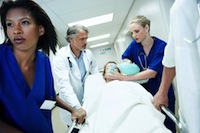
Carbapenem-resistant enterobacteriaceae (CRE) are a highly antibiotic-resistant strain of gut-dwelling bacteria that are difficult to treat and often deadly to those infected with them. According to the CDC, CRE commonly infect patients in intensive care units or long-term treatment programs, where they are transmitted by contaminated medical devices like ventilators and catheters.
The particular devices that infected patients at the UCLA medical center were two duodenoscopes, which are used to diagnose and treat cancer and gallstones. Medical experts have expressed concern about this device, stating that some duodenoscopes are designed in a way that makes them difficult to disinfect, allowing for the buildup of deadly bacteria like CRE.
UCLA issued a statement that it cleaned the devices “according to standards stipulated by the manufacturer.” But in light of recent events, the hospital will go “above and beyond the manufacturer and national standards.”
In January, the Virginia Mason Medical Center in Seattle admitted that between 2012 and 2014, at least 32 patients were infected by contaminated endoscopes with bacteria similar to CRE. Eleven of these patients eventually died.
Incidents of hospital-acquired infections such as these raise concerns about whether hospitals, device-manufacturers, and health care regulators are doing enough to protect the health of patients. The federal government has recently ramped up its efforts to reduce rates of hospital-acquired conditions, but many are claiming that they are not doing enough. “There is either a design issue to be addressed or a change to the guidelines for the cleaning process,” said Dr. Andrew Ross, chief of the gastroenterology section at Virginia Mason Medical Center.
If you believe you or someone close acquired an infection after a duodenoscope procedure, contact the lawyers at Lopez McHugh immediately for a free consultation. You may be entitled to compensation through a medical malpractice or product liability lawsuit.
